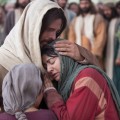 Elizabeth Smart, at age fourteen, told God she was prepared to and willing to serve Him, but needed to know how to do it. Just days later, she was kidnapped by a mentally ill husband and wife. The man considered her his “wife” and repeatedly raped her, beat her, starved her, and forced drugs and alcohol into her system. She didn’t understand, right at first, how God could do that to her just after she committed herself to serve Him. Was this His plan?
Elizabeth Smart, at age fourteen, told God she was prepared to and willing to serve Him, but needed to know how to do it. Just days later, she was kidnapped by a mentally ill husband and wife. The man considered her his “wife” and repeatedly raped her, beat her, starved her, and forced drugs and alcohol into her system. She didn’t understand, right at first, how God could do that to her just after she committed herself to serve Him. Was this His plan?
She eventually came to understand that it was not God’s plan and He didn’t do it to her. He had allowed it to happen, but He didn’t cause it to happen. She also came to realize that even a prisoner has choices and she chose to survive, relying on her faith and the love of her family to keep her going during the months of captivity. Once freed, she chose to follow her mother’s advice and be happy instead of letting her trials damage her life forever. She served a mission for her church, started a foundation to help families of kidnapped children, and married. While she would rather the trials hadn’t happened, she has made use of them to improve her own life and the lives of others. This was how she chose to use her agency.
God is good, loving, and kind. Most religions teach this, which leaves those first exploring religion, and even some of those who have been religious for a long time, to wonder how evil fits into this definition of God. Why would a loving Father in Heaven let His children suffer so much? Why didn’t God protect Elizabeth Smart and so many of His other children who have suffered? Many religions struggle with this question as well.
Elizabeth Smart is a Mormon. Mormon is a nickname sometimes used to describe members of The Church of Jesus Christ of Latter-day Saints. Mormons have answers for these questions that Elizabeth struggled to understand as a young girl. They aren’t easy answers, but they help us to put what is happening into perspective and to understand our own role in putting an end to some types of suffering.
What is the Point of Life, Anyway?
Mormons find their answers in the purpose of life. We believe life started long before we were born, when God organized our eternal intelligences into spirits. Our spirits had forms that looked like us, but were not housed in physical bodies. We lived as spirits with God for a time. The important part of this, for this discussion, is that God gave us agency from the start. Agency is the right to choose for ourselves. We used that agency to decide what sort of people we wanted to become and to decide how much God’s plan mattered to us. We even used it to decide who to follow when the time came.
God called us all together—all the spirits in Heaven—and presented His plan to us. It would send us to earth to gain bodies, families, and experiences. The Plan is similar to a college education and a final exam. Parents know that while their children might make good choices when their parents are right there to guide them, they sometimes make different choices when they leave home and are completely on their own to decide how to live. Leaving home is part of the process of becoming an adult. God knew we needed to leave our Heavenly home to decide how we wanted to live.
We understood there would be challenges and risks. Some people weren’t willing to take those risks. They chose to follow Lucifer, who offered a false risk-free option (one that was never really an option, since God wasn’t willing to defeat the point of mortality). Their progress was ended, and they were cast out forever, never coming to earth to live with a mortal body, and therefore, locked out of the resurrection, as well. The rest of us accepted the risks, hardships and trials we knew we would face.
We knew, though, that we’d have help during these trials. God would remain an active, involved, and loving part of our lives, if we allowed Him to do so. He would send the Holy Ghost to bring us comfort and peace and to help us know what is true.
Since life is meant to be an education, we have to have trials. Our trials help us to grow and to learn. Most trials come about because of the choices of mortals. Sometimes we create our own trials as a result of our bad choices. Sometimes we suffer because of the choices other people make. Other trials, of course, just happen and are no one’s fault. We all have agency and we can choose how to live. Our choices affect us, but they also affect others. There is no such thing as a consequence-free life.
Why Won’t God Stop the Suffering?
What would it take to have a world with no suffering? There are two possible ways this could happen. The first is for everyone in the world to live the gospel fully, to care for each other, and to make good choices. This has happened from time to time on earth. The Bible tells of one such community — the City of Enoch. The people there were so righteous the entire city was taken up into Heaven. The Book of Mormon also mentions a few times when people within a certain group lived that way. There were no poor because they all took care of each other. There was no violence and no cruelty. There were, I’m sure, still trials, since people got sick or hurt. People died, and people made small mistakes that hurt others. However, their trials were minimized because they didn’t face the usual man-made trials that come from cruelty and neglect. The millenial reign of Christ on earth will be this way — there will be no evil, no illness, and no death.
The other way would be for God to take away our agency. He could remove all ability to make choices in life and all consequences, and then there would be no suffering of the man-made kind. However, that would render life meaningless. Why bother coming to earth at all if we can’t choose for ourselves or learn from our experiences? We would be prisoners of a life beyond our control, and no one really wants that.
So, we have agency, and that means that everyone has agency, both the good people and the evil ones. Sometimes we use it well and sometimes we use it very badly. When we use it badly, others suffer who don’t deserve to suffer. Babies go hungry, people are abused, and hearts are broken. God cannot stop the suffering, because He can’t take away our agency. That doesn’t mean He doesn’t care—in fact, it’s because He loves us that He allows us to keep our agency. Parents soon learn the hardest part of parenting is to step back and let their child experience the consequences of his bad choices. God is a parent.
What Does God Do While We’re Suffering? Anything?
Mormons believe God is always there, watching over us, loving us, and helping us when we ask. He rejoices over our good choices and grieves over our bad ones. He isn’t just sitting back and watching, though. While He can’t always end the suffering—at least not right away—He can help us get through it. The Holy Ghost is also called the Comforter. One of His roles is to provide comfort to us when we are suffering. Having comfort makes the trials easier to face. For a Mormon, knowing God is there helps make the trial bearable.
God is in charge of the plan. He won’t allow anything to happen to us that will destroy the plan He made for each of us. Our trials can make us stronger and better prepared for eternity if we choose to use them wisely.
Our Heavenly Father, who gives us so much to delight in, also knows that we learn and grow and become stronger as we face and survive the trials through which we must pass. We know that there are times when we will experience heartbreaking sorrow, when we will grieve, and when we may be tested to our limits. However, such difficulties allow us to change for the better, to rebuild our lives in the way our Heavenly Father teaches us, and to become something different from what we were—better than we were, more understanding than we were, more empathetic than we were, with stronger testimonies of Christ than we had before.
This should be our purpose—to persevere and endure, yes, but also to become more spiritually refined as we make our way through sunshine and sorrow. Were it not for challenges to overcome and problems to solve, we would remain much as we are, with little or no progress toward our goal of eternal life (President Thomas S. Monson, “I Will Not Fail Thee, nor Forsake Thee”, October 2013 General Conference of The Church of Jesus Christ of Latter-day Saints).
God also helps us by asking others to step in and do something about the problem. Someone once asked me why God didn’t do something about the starving children in Somalia. I told her He did—He put it in her heart to worry about them so she would donate to causes that feed those children. He put it into the hearts of others to start those aid organizations that are trying to improve conditions there. We have our agency, though. We can choose to act on the concern He placed in our hearts or we can sit back and wonder why God doesn’t do it all for us. God didn’t make those people poor. He did, however, ask some of His children to help make life better. Many have answered those calls. Many have not.
God can also invite people to take the needed steps to end a trial. Eventually, Elizabeth Smart was rescued. She convinced her kidnapper to return to Utah with her and there, she was recognized by some people who took action. The rescue relied on Elizabeth and others to do certain things, but everyone did his or her part, and the horrible experience ended. She then chose to follow her mother’s advice and to be happy, rather than to spend her life using victimhood as a reason for not moving forward.
Reading the stories of people who turned trials into blessings can help us to see ways we can use our trials to become the people God wanted us to be. God expects us to make good use of the challenges we face. Following are some true stories of modern people who, like Elizabeth Smart, faced awful trials and yet went on to have amazing lives.
Mariama Kallon
Mariama Kallon lived in war-torn Sierra Leone. As she and her family tried to escape rebel soldiers, her parents were killed just behind her. She was forced to leave them there as she continued her desperate race for her life. Her brother was killed by rebels, and then she and her sister were captured. All the captured women were lined up and the soldiers began to brutally cut off their legs. She waited as her sister’s legs were forcibly amputated, knowing she was next. However, at that moment, government soldiers arrived and frightened off the rebels. Her sister died in the hospital. All of her family was killed except for a two-year-old nephew and a ten-year-old niece. She took the children in and then struggled to figure out how to care for them, since she no longer had a home. She began to pray to know if God even existed.
A friend took Mariama and the children in, and it was while living there, that she became a Mormon. Becoming a Mormon did not put an end to her trials, though. Her new home was burnt by rebel forces and again, Mariama was homeless and on the run from danger. After a long period of living in hiding with twenty-five other women, she decided to serve a Mormon mission to thank God for protecting her. A religious leader offered to care for the children, and she was sent to Utah to serve at Temple Square. She arrived with only two outfits, a hygiene kit she’d been given by the Church to help her through her time of homelessness, and her scriptures. Because she arrived in the middle of winter, church leaders took her immediately to buy shoes and a coat—she had none.
She lived in the United States as a refugee after her missionary service ended. There, she was able to find new adoptive parents for her niece and nephew. She now works for the Church and is a popular inspirational speaker, bringing messages of hope to people struggling with the trials of life.
Stephanie Nielson
Stephanie Nielson, a wife and mother of four, was a popular Mormon Mommy blogger, writing about the joys of family life to a large audience. When she was twenty-seven, she and her husband, along with her husband’s flight instructor, left for a day-long trip in a small Cessna. The plane crashed, and the instructor eventually died. Both Stephanie and her husband were badly burned and were in medically-induced comas. Her husband awoke after five weeks, but Stephanie’s injuries were far worse. She remained in her coma throughout many treatments, finally being awakened after three months. When she realized what she now looked like, she was afraid. Her children were unable to look at her, and she wondered if they’d be better off just forgetting about her. Her youngest didn’t even recognize her and called his aunt “Mom.” More than 80 percent of her body was burned, and many surgeries were required to give her new skin.
At her father’s encouragement, she began working hard to recover. Her children adjusted, and she began sharing her story on her blog and in media interviews. She has since written a book and been featured in a viral YouTube video made by her church. Stephanie Nielson is also a Mormon. She has taken her tragedy and turned it into a way to tell people that who they are inside matters more than who they are outside. Although her appearance is strongly altered and shows the effects of the burns, she is not ashamed to show her face to the world.
Watch My New Life:
Meg Johnson
Meg Johnson was climbing around on St. George, Utah’s, red rocks when she took a jump to another rock. She lost her footing and sailed over a cliff she hadn’t even known was there. She became a quadriplegic. Her ex-boyfriend came to visit her in the hospital and returned every week. They were married four years later, and today Meg is a wife and mother. She has done a series of videos showing how she completes everyday tasks, has written a book, and is a motivational speaker. She teaches people that we get to decide what is—we choose how to view our lives.
How Can I Make the Best of My Trials?
The women described above have gone on to be famous. Most of us won’t take that route. It’s important to remember, though, that these women didn’t start giving motivational speeches the first day of their trial. First, they worked through the grieving and the fear and the anger. They used their agency to say, “I’m going to have a great life. This problem isn’t going to stop me.” Then they worked hard to figure out how to make life good and went to work creating the life they’re now writing and speaking about.
We can’t control every aspect of our life. God chooses to let some trials happen. Some, like Elizabeth Smart and Mariama Kallon, faced horrible tragedies because others chose to use their agency in an evil way. Others, like Stephanie Nielson and Meg Johnson, just had things happen that were no one’s fault. All four had aspects of their lives changed without their consent, but all chose to control the parts they could control. They chose to make their new lives even better than their old lives.
For Mormons, putting trials into perspective makes a difference. Mormons know this life is only a small portion of our entire eternal lives. The trials we’re facing now help prepare us to be everything we can be, but there is another life ahead of us in which the trials will be gone. That life will last forever. Through the atonement of Jesus Christ, we can live forever with God if we’re willing to prepare ourselves for such a great gift.
Many of you are now passing through physical, mental, and emotional trials that could cause you to cry out as did one great and faithful servant of God I knew well. His nurse heard him exclaim from his bed of pain, “When I have tried all my life to be good, why has this happened to me?”
You know how the Lord answered that question for the Prophet Joseph Smith in his prison cell:
“And if thou shouldst be cast into the pit, or into the hands of murderers, and the sentence of death passed upon thee; if thou be cast into the deep; if the billowing surge conspire against thee; if fierce winds become thine enemy; if the heavens gather blackness, and all the elements combine to hedge up the way; and above all, if the very jaws of hell shall gape open the mouth wide after thee, know thou, my son, that all these things shall give thee experience, and shall be for thy good.
“The Son of Man hath descended below them all. Art thou greater than he?
“Therefore, hold on thy way, and the priesthood shall remain with thee; for their bounds are set, they cannot pass. Thy days are known, and thy years shall not be numbered less; therefore, fear not what man can do, for God shall be with you forever and ever” (President Henry B. Eyring, Mountains to Climb, Ensign, May 2012).
Sources:
Mark Albright, Missionary Moment: The Mariama Kallon Conversion Story, Meridian Magazine, April 15, 2013
Emily W. Jensen, Hygiene kit gave hope in war-torn Sierra Leone, Deseret News, February 7, 2010
Escape to Freedom: An Interview with Mariama Kallon, Time Out for Women,July 3, 2012
Alice Gomstyn and Shana Druckerman, Stephanie Nielson’s Story: After Tragic Crash, Mom of Four Nearly Lost It All, ABC News, May 12, 2011
The late Terrie Lynn Bittner—beloved wife, mother, grandmother, and friend—was the author of two homeschooling books and numerous articles, including several that appeared in Latter-day Saint magazines. She became a member of the Church at the age of 17 and began sharing her faith online in 1992.





